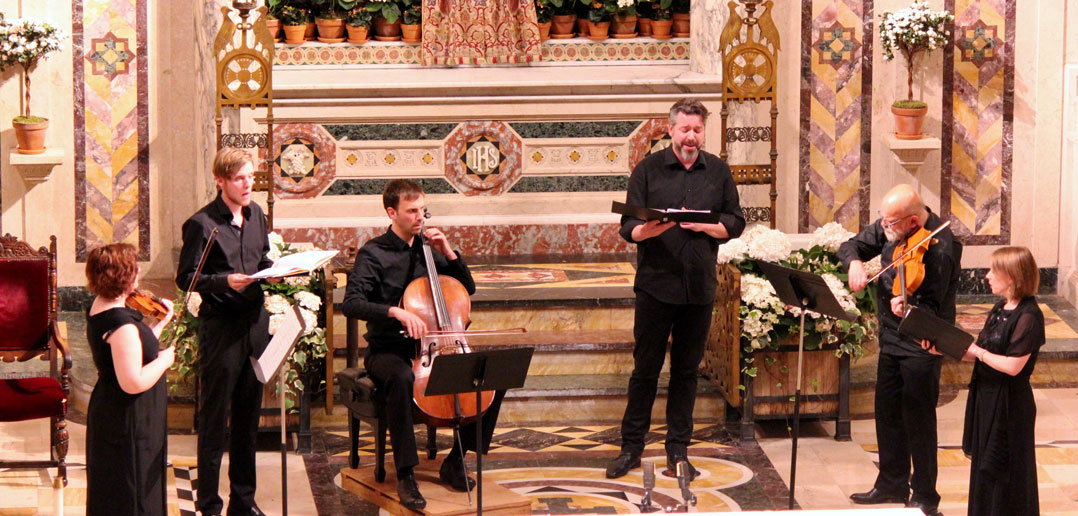The scholars and journalists are part of a multi-year $700K project seeking to understand the relationship between Orthodox Christianity and multiple forms of human rights that brings together historians, political scientists, religious anthropologists and theologians.
Within this group of 25 scholars, nearly half have expertise in Russia/Ukraine/Balkan regions and/or understand the ways in which Putin’s instrumentalizing of religion has built transnational networks reaching even into the United States.
This unique project, funded by the Henry Luce Foundation with additional support by the Leadership 100, brings together a collection of elite scholars who understand religious dimensions of the situation in Ukraine. Read more about this group of scholars and journalists here.
The Center’s co-directors are also available for interviews.
Read “The Orthodox Response to Putin’s Invasion,” by George E. Demacopoulos, our Fr. John Meyendorff & Patterson Family Chair of Orthodox Christian Studies and a co-founder and director of our Orthodox Christian Studies Center.
About the Orthodox Christian Studies Center at Fordham:
The Orthodox Christian Studies Center facilitates, finances, and publishes scholarship on the history, thought, and culture of the Orthodox Christian world. Through lectures, scholarly publications, and student initiatives such as the Orthodox Christian Fellowship and the Orthodox Christian studies minor, the center promotes serious scholarship and lifelong learning. The center’s work paints a broad picture of Orthodoxy’s history, religious traditions, and geographical, geopolitical, and cultural reach.
CONTACT:
Aristotle Papanikolaou, [email protected]
George Demacopoulos, [email protected]
Gina Vergel, 646-579-9957, [email protected]
This comes on the heels of a new report about “Orthodox Christianity in the 21st Century,” released by Pew on Nov. 8, which found that “over the last century, the Orthodox Christian population around the world has more than doubled and now stands at nearly 260 million. In Russia alone, it has surpassed 100 million, a sharp resurgence after the fall of the Soviet Union. Yet despite these increases in absolute numbers, Orthodox Christians have been declining as a share of the overall Christian population – and the global population – due to far faster growth among Protestants, Catholics and non-Christians.”
The report also found that many people who now identify as Orthodox Christians do not see religion as an important part of their lives. Demacopoulos was asked to explain this gap between religious identity and religious practice in much of the Orthodox world:
“It is very difficult for Americans to appreciate the ways in which religion and cultural identity overlap in the Orthodox world. For most Americans, religious commitment consists primarily of a set of doctrinal faith affirmations: “I believe in this and this, but not that.” In most of the world, however, religious identity and association operate on much deeper level, with strong, community-based, cultural associations,” Demacopoulos said.
“Being Orthodox is not so much about checking off a list of dogmatic propositions as it is being tied to local and regional culture. Thus, it would not at all be uncommon for someone in Greece or Russia to identify as Orthodox and participate in major community celebrations tied to Christianity (Easter, Christmas, Theophany, etc.) but not actually believe in the teachings of the church or, possibly, even in God.”
Read the full Q&A at the Pew FactTank blog.
]]>The achievements and “spiritual” impact of his music is why he was the subject of a conference, Arvo Pärt: Sounding the Sacred, held in May at McNally Amphitheatre, said Holsberg.
The conference was the result of a collaboration between the Orthodox Christian Studies Center of Fordham and the Sacred Arts Initiative of St. Vladimir’s Seminary. It sought to gain new answers as to how Pärt’s music affects the spiritual nature of humans.
The dual focus of the conference, that of sound and the sacred, sparked discussion on the duality of his music.
“The conference made real gains in furthering Pärt studies, moving them from exclusively musicological discussions to engaging perspectives from philosophy, theology, cultural history, performers, and others,” said Holsberg, “Pärt’s music affects not only listeners in the seats of concert halls, or those listening with earphones in the comfort of their homes, but the musicians who listen as they also bring the music to life.”
The four-day conference included keynote addresses, a special performer’s panel, and a public concert held at Holy Trinity Church featuring the Goeyvaerts String Trio, Andrew Shenton, and Yousif Sheronick.
The performer’s panel included Juilliard conductor Joel Sachs, and the recording and performance artist Laurie Anderson.
Two Fordham professors, Andrew Albin, Ph.D., and Sevin Yaraman, Ph.D., were among those who delivered addresses.
Using the the medieval chant traditions that can be found in Pärt’s work, Albin illuminated how sound works in distinct ways in the poetry of Richard Rolle and in the work of Arvo Pärt.
Yaraman gave the listeners a sense of how “sound” and “the sacred” in different faith traditions can still fundamentally function at similar levels.
“For the Orthodox Christian Studies Center, Arvo Pärt represents in many ways the musical embodiment of the center’s ecumenical nature,” said Holsberg.
-Veronika Kero
]]>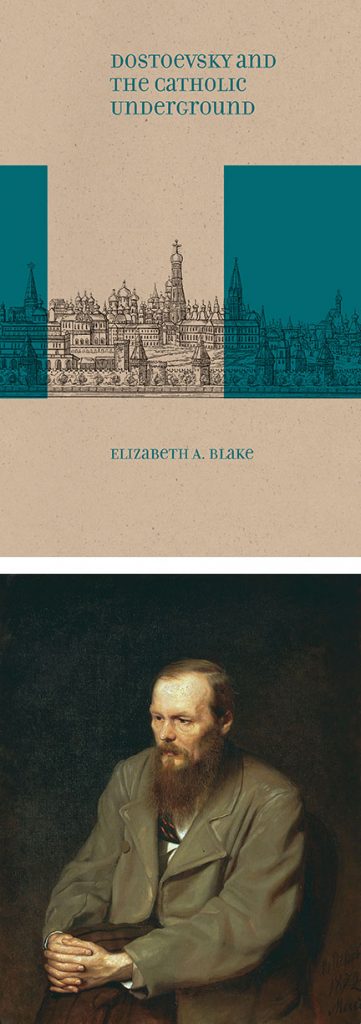 Fyodor Dostoevsky, author of Crime and Punishment and The Brothers Karamazov, is well known for his prolific writing and acute insight into human psychology.
Fyodor Dostoevsky, author of Crime and Punishment and The Brothers Karamazov, is well known for his prolific writing and acute insight into human psychology.
Less known about the Russian novelist is his fascination—as well as his criticism—of Catholicism.
At a Nov. 10 lecture sponsored by the Orthodox Christian Studies Center, Dostoevsky scholar Elizabeth Blake, PhD, assistant professor of Russian at Saint Louis University, spoke with undergraduates and faculty at the Rose Hill campus about Dostoevsky’s strong opinions about religion. The author, who yesterday would have celebrated his 194th birthday, was deeply critical of Catholics and especially of the Society of Jesus.
In her book Dostoevsky and the Catholic Underground (Northwestern University Press, 2014), Blake traces Dostoevsky’s disapproval back to his experience as a political prisoner in Siberia. For four years he was imprisoned with a group of Polish Catholic political activists and revolutionaries.
Besides resenting the Poles for their contempt of the Russian prisoners, Dostoevsky, a Russian Orthodox Christian, was wary of the Poles’ allegiance to the Jesuits, whose organizational structure was likened by Dostoevsky’s co-conspirators to communism. It didn’t help matters that the Jesuits vowed obedience to the pope—Pius IX at the time—whom Dostoevsky considered to be a spiritually manipulative figure.
Dostoevsky continued to harbor this mistrust when, decades later, as a member of the Society for Lovers of Spiritual Enlightenment (OLDP), he participated in discussions regarding the possibility of reuniting the long-divided Eastern Orthodox Church and the Western Catholic Church.
Needless to say, he was not in favor of the union.
“[He] indicates that such a union requires coercion, which Dostoevsky finds at the heart of the ‘Roman idea’ of ‘forced unity of humanity,’” Blake said. Dostoevsky described this coercion on the part of the Catholic Church with the sentiment: “Be my brother, or off with your head.”

Photo by Joanna Mercuri
This obsession with Catholicism, which Blake said vacillated between fascination and repulsion, inevitably colored Dostoevsky’s writings. According to Blake, it underlies one of the best-known passages in literature, the parable of the Grand Inquisitor, told by the character Ivan in The Brothers Karamazov.
“It reinforces [the church’s]image as a feudal institution,” Blake said. “The Grand Inquisitor’s theological justification for the use of the auto-da-fé [a type of punitive torture used during the Inquisition]on his flock for their own protection . . . [and his]manipulation of the sacred mysteries to maintain control over his flock parallels the measures of political repression . . . adopted by the Catholic Church.”
Indeed, Blake said, Dostoevsky could be bold in his characterization of Catholicism.
Then again, “If he were cautious, he wouldn’t have written these great novels,” she said.
Founded in 2012, the Orthodox Christian Studies Center is the first university-based center for Orthodox Christian Studies in the western hemisphere. The center supports scholarship and teaching that is critical to the ecclesial community, public discourse, and the promotion of Christian unity.
]]>At a ceremony at the Rose Hill campus, members of the Fordham and local Orthodox communities gathered to honor the addition of the Father John Meyendorff & Patterson Family Chair of Orthodox Christian Studies as well as its inaugural holder, George Demacopoulos, PhD, co-founding director of the center.
“Being named the inaugural holder… is a profoundly humbling honor,” said Demacopoulos, a professor of historical theology. “[Father Meyendorff] pioneered Orthodox Christian Studies as its own intellectual enterprise—not just at Fordham but throughout the American academic community.”
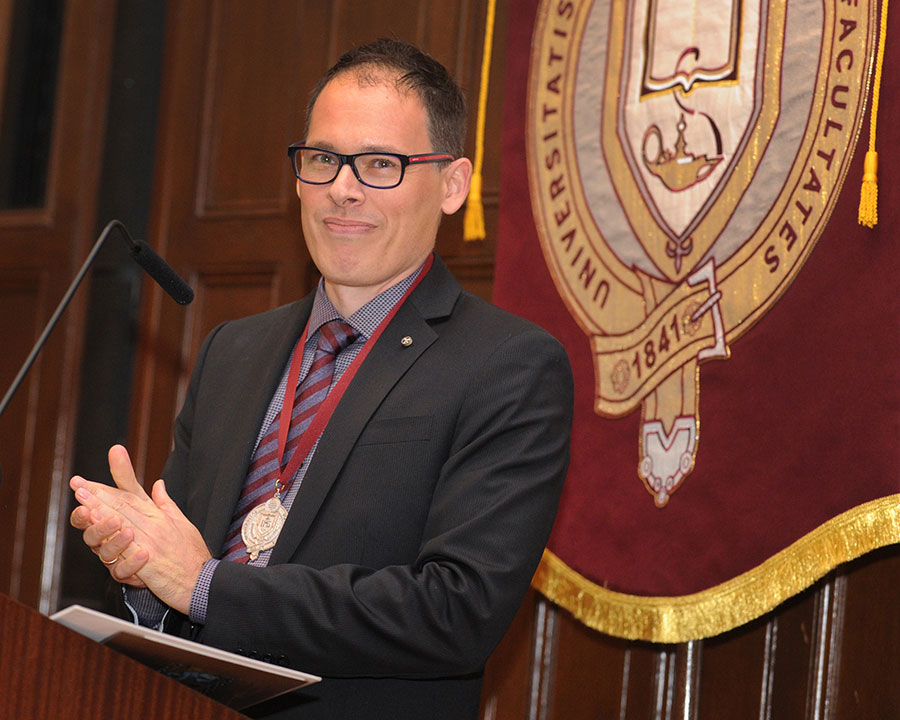
Photo by Chris Taggart
A gift from Solon and Marianna Patterson, the chair supports scholarship and teaching on the relationship between Eastern Orthodox and Roman Catholic traditions. It is named for both the Pattersons, who also endowed the Patterson Triennial Conference on Orthodox-Catholic Dialogue, and Protopresbyter John Meyendorff, a professor of Byzantine history at Fordham from 1967 to 1992.
Demacopoulos’ inaugural lecture, “War, Violence, and the Feast of the Holy Cross in Byzantium,” focused on the Feast of the Holy Cross, an Orthodox Christian holiday celebrated on Sept. 14 every year to commemorate Christ’s death on the cross and, with it, his “triumph over death.”
Though originally a religious holiday, the feast took a political turn around the year 614, when Byzantine emperor Heraclius appropriated the symbol of the cross for his military pursuits, infusing Orthodox religious piety with a healthy dose of militarism.
This bellicose spirit found its way into some of the liturgical hymns sung on the feast day—songs like Soson Kyrie, which prays for God, through the cross, to “grant victory to the emperor against the barbarians.”
The problem with these hymns, Demacopoulos said, is that they made a lasting impact on the churchgoers who sung them. Like any a song that “gets stuck” in one’s head, these catchy tunes lodged in the collective Orthodox subconscious and infected it with a warped political understanding of religiosity.
“New advances in cognitive science and musicology have demonstrated that music affects our brains more powerfully than other sensory stimulate,” he said. “Short, bold, and catchy hymns like Soson Kyrie perfectly fit this model.”
Centuries later, this canon of militaristic hymns and its “errant political theology” still endure among some Orthodox Christian groups and political opportunists.
“Hymns like Soson Kyrie help to sustain an imperialized and militarized version of Orthodox Christianity,” Demacopoulos said. “Left unchecked, this sentiment can fuel a radical populism of intolerance and ignorance.”
This, he continued, is why many traditional orthodox countries today struggle with “a kind of religious nationalism that is nostalgic rather than genuine and xenophobic rather than Christian.”
The irony, he argued, is that these hymns belie the modern Orthodox “narrative of victimization” at the hands of Western Christians. That narrative relies on the assumption that only Western Christian Crusaders sank to the level of “sacralizing violence” in the Middle Ages.
That claim simply isn’t true, he said. Moreover, the difficult task of striving for peace will require cooperation on the part of both the Eastern and Western churches.
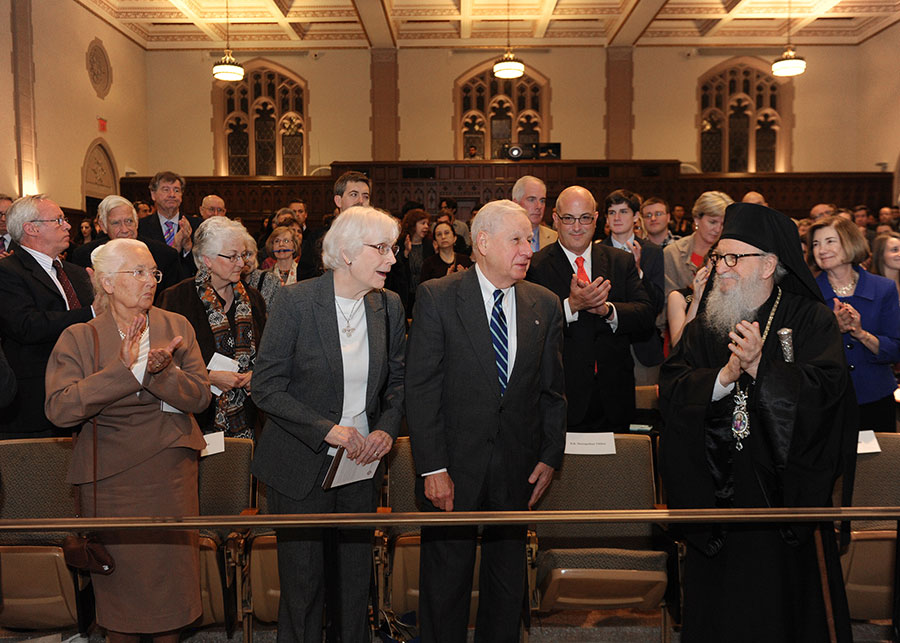
Photo by Chris Taggart
“If we have any hope in addressing the unprecedented challenges that lie before us—terrorism, school shootings, refugees, poverty, ecological destruction—the way forward can only be one of Christian unity,” Demacopoulos said. “And, on the Orthodox side of things, this can only begin if we have the courage of faith to shed the naïve presumption that the Byzantine Church never made mistakes.
“The Byzantines knew that different times called for different hymns—that is why they constantly produced new hymns that spoke to their present. It is time we did the same.”
The Meyendorff/Patterson Chair joins the Orthodox Christian Studies Center’s Archbishop Demetrios Chair in Orthodox Theology and Culture, which was created by the Jaharis Family Foundation and is held by Aristotle Papnikolaou, PhD, senior fellow and co-founder of the center.
]]>Eva Badowska, PhD, dean of the Graduate School of Arts and Sciences (GSAS), presented the diploma to Baker’s wife, Presbytera Katherine. She was accompanied by two of her sons—Isaac, 12, who accepted his father’s doctoral hood, and Cyril, 4. It was the final award given out at the GSAS diploma ceremony at the University Church on the Rose Hill campus.
Baker is mourned by Fordham faculty and colleagues and by the entire Orthodox theological community. A letter from His All Holiness Bartholomew, Archbishop of Constantinople, New Rome and Ecumenical Patriarch was read at Baker’s funeral, Badowska said.
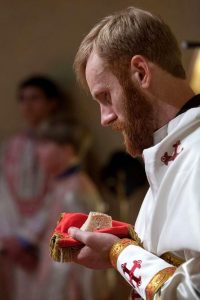
Baker was one year shy of completing a dissertation on Georges Vasilievich Florovsky, an Orthodox Christian priest, historian, theologian, and ecumenist who engaged in the 20th-century philosophy movement of hermeneutics, she said.
“Though his dissertation was not yet finished, Father Matthew Baker already established himself as an expert on the thought and writings of Orthodox theologian Georges Florovsky and published numerous articles on Florovsky and related topics, many of which were translated into Greek and Russian,” Badowska said.
“At the time of his death, his curriculum vitae was already well ahead of what we typically expect of freshly minted PhDs. This posthumous doctorate thus honors not simply his memory and the goal he and his family had worked towards, but his actual academic achievements.”
A native of Cranston, Rhode Island, Baker resided at St. Vladimir’s Orthodox Theological Seminary in Yonkers while he worked toward his degree. He held a Master of Divinity from St. Tikhon’s Orthodox Theological Seminary in South Canaan, Pennsylvania and a Master of Arts from Holy Cross Greek Orthodox School of Theology in Brookline, Massachusetts.
He was ordained to the priesthood in January 2014 by His Eminence Methodios, Metropolitan of Boston of the Greek Orthodox Archdiocese of North America. That same month he began teaching as an adjunct professor of theology at Hellenic College/Holy Cross Greek Orthodox School of Theology.
Aristotle Papanikolaou, PhD, professor of theology and the Archbishop Demetrios Chair in Orthodox Theology and Culture, served as his dissertation adviser.
Papanikolaou, who is also senior fellow and co-founder of Fordham’s Orthodox Christian Studies Center, said Baker was no ordinary doctoral student.
“Matthew had a brilliant mind and a great love of theology, but not simply for its own sake. He believed it mattered for people’s lives, and most especially for people’s relationship with God,” he said.
“He’d already developed international contacts, and was becoming internationally recognized as an emerging voice in Orthodox theology.”
An online crowdfunding account set up to help provide for his family raised $763,900 from 6,543 donors. Information on providing support can be provided here.
]]>On Dec. 3, Fordham’s Orthodox Christian Studies Center convened a panel of experts for “Syria in the Crosshairs: Religion, Violence, and the Legacy of Exploitation in the Arab World.” Moderated by George Demacopoulos, Ph.D., professor of theology and co-founding director of the center, the panel featured:
- Michael Wahid Hanna, fellow at The Century Foundation;
- Nadieszda Kizenko, Ph.D., associate professor of history at the University at Albany, State University of New York;
- Joseph Massad, Ph.D., associate professor of modern Arab politics and intellectual history at Columbia University; and
- Christopher Awad, a senior at Fordham College at Rose Hill and a student in the Orthodox Christian Studies program.
Disagreement among the panelists themselves demonstrated that the conflict is more than a binary matter of government-vs.-opposition. According to Massad, although sectarian violence in Syria is pronounced, the conflict did not stem from sectarianism. Rather, these internal conflicts are the result of a long history of outside interference from France, Britain, and other European powers throughout the 18th, 19th, and 20th centuries.
“This level of sectarian violence was unprecedented prior to these massive European interventions,” Massad said. “These sorts of massacres [in Lebanon, Bulgaria, Armenia, Damascus, and elsewhere]did not exist previously.”
The consequences of American intervention in the Middle East corroborate this pattern, he said. He cited an American presence in Iraq as the reason for intensifying conflicts between Sunni and Shiite Muslims and between Kurdish and Arab populations.
Hanna disagreed, saying it is a mistake to link sectarian violence with European or American aggression.
“Sectarianism has deep roots within the region… and it is a much more complex situation than one that looks at Western intervention only,” he said.
With regard to Syria, he added, the prospect of American intervention is less problematic than the nation’s general lack of coherent policy. The debate has stalled at a false dilemma in which Americans believe the only possible responses are intervention or laissez-faireism.
“There is a large middle ground of options that the administration has eschewed,” Hanna said. “But the upper limits of what Americans can do at the moment are mitigation and containment, and a policy that only makes things 15 to 20 percent better is a tough sell in Washington, especially after a decade of disastrous interventions in the region.”
In the meantime, he said, the global community ought to heed the deepening humanitarian crisis in Syria, a point stressed by the panel’s student member, Awad. America’s scant understanding of the conflict is dismaying, he said. Recent polls have found that a mere 18 percent of Americans follow news about Syria. He suggested that the Fordham community can draw on its Jesuit and Catholic roots to make strides toward a greater understanding of the crisis.
“We should be concerned about what’s going on with people in other places, especially if we share a bit of our identities with them,” he said.
To watch a video of the event, click here.
]]>
Members of Fordham’s Orthodox Christian Studies Center joined the world’s leading Orthodox scholars at an international conference held May 23 to 26 at the University of Babes-Bolyai in Cluj-Napoca, Romania.
The conference, “Can Orthodox Theology Be Contextual? Concrete Approaches from the Orthodox Tradition,” featured dozens of theologians and Orthodox scholars from around the world. Co-sponsored by the Orthodox Christian Studies Center, the conference examined the present challenges facing Orthodox theology and the future of its patristic heritage.
“Orthodoxy has a message, but it is still missing the language,” said Radu Preda, Th.D., director of the Romanian Institute for Inter-Orthodox, Inter-Confessional, and Inter-Religious Studies, located in Cluj-Napoca. Preda offered an introduction to the conference. “In order to learn it, Orthodoxy has to realize profoundly the problematics and expectations of modernity.”
Among the presenters were Fordham’s Aristotle Papanikolaou, Ph.D., professor of theology and co-founding director of the Orthodox Christian Studies Center, andCrina Gschwandtner, Ph.D., visiting associate professor of philosophy.

Papanikolaou’s talk, “Personhood, Virtue, and War,” proposed an Orthodox theology of personhood that drew on St. Maximus the Confessor’s description of virtue as learning how to love, focusing especially on how this theory pertains to the ethics of war.
Gschwandtner argued in her presentation that philosophy serves an important purpose in the Orthodox tradition. She suggested that philosophy—especially the hermeneutics and phenomenology of contemporary French philosophy—could provide tools for theological thinking and thus assist contemporary Orthodox theology as it finds its place in the postmodern world.
The conference was organized by the Volos Academy for Theological Studies, Greece, and, in addition to Fordham, was co-sponsored by:
- the Romanian Institute for Inter-Orthodox, Inter-Confessional, and Inter-Religious Studies; the Chair of Orthodox Theology at Münster University, in Germany;
- the Christian Cultural Center of Belgrade/Institute for the Study of Culture and Christianity, in Serbia;
- the St. Andrew’s Biblical Theological Institute, in Moscow;
- the European Forum of the Orthodox Schools of Theology, in Brussels; and was supported by
- the Orthodox Metropolis of Cluj and the Faculty of Orthodox Theology of Babes-Bolyai University, in Romania.
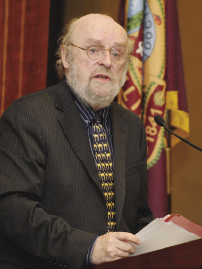
Photo by Chris Taggart
No Christian theologian can fully understand his or her area of study without possessing a thorough knowledge of other forms of Christianity, according to a guest lecturer who spoke at Fordham.
“To take on the responsibility of Christian theology today demands a willingness to be transformed by serious … study of at least the three major forms of Christianity—Orthodox, Catholic and Protestant,” said David Tracy, S.T.L., S.T.D., the Andrew Thomas Greeley and Grace McNichols Greeley Distinguished Service Professor Emeritus at the University of Chicago.
“Orthodox theology in its diverse and sometimes conflictual forms is distinguished by its profoundly contemplative character,” Tracy said as part of this year’s Orthodoxy in America lecture on Nov. 28.
He pointed out that the understanding of all forms of Christianity is grounded in a realized human experience of God.
Orthodox theology illustrates that realization in its beauty, liturgy and history, he said. It is particularly strong in its great tragic theology and Russian apocalyptic theology. The latter, Tracy said, is often unjustly left by the wayside by theologians.
“As Virginia Woolf observed in her splendid essay, ‘The Russian Point of View,’ reading the Russians makes one feel suddenly in another, far stranger and deeper world,” he said. “Woolf is surely right to claim Russian art and thought is pervaded, above all, by soul.
“The Russian soul in its arts and its theologies, with its accursed questions, has unnerved and nourished all humanity,” he continued. “That single gift is as great as the contemplative serenity of Greek Orthodox theologies.”
Tracy said that the greatest tragedy in theology is the split between spirituality and theology that occurred when the study of theology was moved from monasteries into universities.
“This 14th-century separation of theology and spirituality allowed the commentator traditions and the later neo-scholastic traditions to develop a mystical theology separate from theology proper.”
Tracy told the audience that the social sciences also play a role in understanding theology.
“All Christian theological understandings are contemplative intuitions, both informed by—as well as to be challenged by and to challenge—other basic religious intuitions and often philosophical, historical and social-scientific arguments.”
Hard sciences, such as physics, also contain a theological element. For example, recent advances in string theory call for a fresh outlook on cosmic theology, he said.
“As a theologian, I have never witnessed a stronger call for some new contemplative theology of the cosmos. I turn with hope, once again, to Orthodox theology, the most practiced of contemplative-cosmic theologies.”
The lecture was sponsored by the Orthodox Christian studies program at Fordham.
Davor Dzalto, Ph.D., studies contemporary art and how it relates to the theory of personhood in Orthodox Christianity. Additionally, he analyzes the semiotics of medieval religious iconography and contemporary images and how they influence people’s perceptions of reality.
While Dzalto is at Fordham, he will collaborate with Aristotle Papanikolaou, Ph.D., associate professor of theology and co-founding director of the Orthodox Christian Studies program.
“The theology department and Orthodox Christian Studies program will be enriched by the presence of an international scholar who is working to relate the Christian tradition to contemporary thought,” Papanikolaou said.
“We will benefit by hearing about his work and having conversations with him,” he said. “Hosting Dr. Dzalto will facilitate our mission to foster an ongoing dialogue between the Catholic and the Orthodox Christians traditions.”
In addition, Dzalto will spend time at St. Vladimir’s Orthodox Theological Seminary in Yonkers, N.Y., and the Holy Cross Greek Orthodox School of Theology. He will travel outside New York to give lectures in Chicago and at Indiana University and the University of Oklahoma.
story continues below

His current research compares some contemporary theories of image—developed by Jean Baudrillard and Slavoj Zizek—to the theology of icons in Orthodox Christianity.
“There are many interesting points that can be mutually related in both of these conceptualizations of images,” said Dzalto, whose work is influenced mainly by Nikolai Berdyaev and John Zizioulas.
“The theology of icons was developed during the iconoclastic controversy—in the eight and ninth centuries,” he said. “At that time, a very specific theory of image was formulated, which determined the place of icons in the liturgy as well as their meaning in respect to history and eschatology.
“One of the very fundamental properties of icons is that they represent not ordinary portraits, but ‘eschatological portraits’ of human people. This way, icons change the way we perceive reality and its significance,” he said.
Dzalto pointed out that, in a certain sense, images grew to be more important than actual objects.
“In the ninth century, Patriarch Nicephorus claimed that if we remove images, then the whole world disappears,” he explained. “The same idea is evident in contemporary theories of image; in Zizek’s words, ‘Images are the reality,’ so if they are removed, there is nothing left.”
According to Dzalto, this means that “images must be there to preserve, in some sense, the meaning of the world.”
“It’s remarkable to me how—after so many centuries—we have come again to the point where we think of images as things that are, in some sense, reality—that we can’t approach the reality without images,” he said.
– Jenny Hirsch
]]>

George E. Demacopoulos, Ph.D., and Aristotle Papanikolaou, Ph.D., associate professors of theology, were installed as Archons at an Oct. 31 ceremony held at the Archdiocesan Cathedral of the Holy Trinity in Manhattan.
“His All Holiness Bartholomew could not have chosen better in elevating Dr. Demacopoulos and Dr. Papanikolaou as Archons,” said Joseph M. McShane, S.J., president of Fordham. “In their ecumenism, scholarship and devotion to the Ecumenical Patriarch, they represent what is best at Fordham. We celebrate their installation not merely for Telly and George’s sake, but because it represents yet another tie between Fordham and our Orthodox brethren.”
Demacopoulos and Papanikolaou are founding co-directors of Fordham’s Orthodox Christian Studies program, the first of its kind at a major university in the United States. The program includes an interdisciplinary minor in Orthodox Christian Studies; the annual Orthodoxy in America Lecture; and a triennial conference dedicated to a historical and theological analysis of the Orthodox/Catholic rift. The proceedings of the first conference, Orthodox Readings of Augustine, which took place in June of 2007, was published in the Fall of 2008.
“This is a very high honor that the church presents to Orthodox laymen who have distinguished themselves in service to the church,” said Anthony J. Limberakis, the national commander of the Archons and an Archon of the Ecumenical Patriarch since 1987. “These young professors are so worthy because of the work that they have done specifically with the return of the relics, their unique role in that work.
The title of Archon dates back to ancient Greece and was appropriated and transformed by the Christians of the Byzantine Empire. According to the Archon website, an Archon is sworn to defend and promote the Orthodox Christian faith and tradition. His special concern and interest is to serve as a bulwark to protect and promote the Sacred See of St. Andrew the Apostle and its mission. He is also concerned with the human race’s inalienable rights wherever and whenever they are violated – and the well-being and general welfare of the Christian Church.
“After His historic visit to Fordham, His All Holiness commented on the perfect harmony that existed between the Jesuit Community and the Orthodox Christian studies program,” said Father Alexander Karloutsos, Protopresbyter, Ecumenical Patriarchate. “By honoring Telly and George, the Ecumenical Patriarch wanted to also honor Fordham and its President for enthusiastically advocating a dynamic synergy of Orthodox and Catholic thought in an academic world.”
“Being nominated to the Order of St. Andrew/Archons of the Ecumenical Patriarchate is a humbling honor and a testament to the extent to which the University’s commitment to the Orthodox Christian Studies Program is respected and appreciated by the Orthodox Church in general and the by Ecumenical Patriarch in particular,” said Demacopoulos.
Papanikolaou said he is receiving the honor on behalf of the entire Fordham community.
“Without Fordham’s unwavering support and embrace of our initiatives in Orthodox studies, this wouldn’t be happening,” he said. “I am very grateful to my Fordham colleagues and friends.”
When someone is elected to the Order they are given specific titles, which reflect ancient offices from the time of the Roman Empire.
Papanikolaou’s, in translation, is “Defender of Letters,” which should be interpreted as “Defender of Church Teaching” or “Defender of Doctrine.” Demacopoulos’ is “Teacher of the Nations.”
“These titles correspond to the profession of the individual and corresponds to the ancient titles that were used during the Byzantine Empire,” said Limberakis. “By honoring George and Telly, it’s our way of also honoring Fordham University in its leadership role of recognizing the Ecumenical Patriarchate and honoring Father McShane as he deserves outstanding credit.
“We recognize his fundamental role in reinforcing the relationship between Fordham, the Catholic Church, the Ecumenical Patriarchate and the order of St. Andrew,” Limberakis said.
]]>